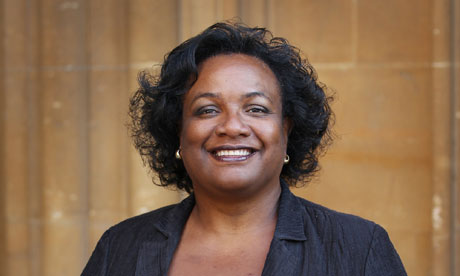
There is an "anything goes" attitude to sex in Britain that marginalises families and degrades girls, the shadow public health minister Diane Abbott will say in an extraordinary attack on how the market has created a hypersexualised culture.
Abbott, traditionally seen on the left of the party, will condemn "the looming sexualised advertising; the music videos that blare out at us; the fashionable online bullying; the hypermasculinised music lyrics, and the sexualised figures of women in films that are now commonplace".
She will claim: "We're seeing an alien, warped view of sex normalised into our culture, engrained by the invisible hand of the market."
In a speech to the Fabian Society women's network she will condemn a "striptease" culture, with the British family unit left marginalised. "It's a hypersexualised British culture in which women are objectified, objectify one another, and are encouraged to objectify themselves; where homophobic bullying is normalised; and young boys' world view is shaped by hardcore American pornography and other dark corners of the internet."
She will claim this near secret culture is in part caused by fast moving technology that often leaves parents ignorant of what is going on. "Mobile phones allow young people easy access to all kinds of online content, regardless of whether or not it is appropriate," she will claim.
She will propose that it becomes easier for parents to block adult and age-restricted material across all media.
In an intervention that will challenge the Conservative claim that they have a monopoly of the discussion of sexualisation of childhood, she will argue that most children say their sex education is out of touch, irrelevant and too little, too late.
Boys she will say "end up turning to hardcore online pornography to teach them what they think they need to know. Children of every background regard "sexting" in schools as normal", and too many see Jessica Ennis as a less important role model than Paris Hilton.
She will insist she is not arguing for "prudishness or hankering after some rose-tinted picture of childhood", but for families and children that can negotiate issues of sexuality with dignity and respect.
The Jimmy Savile scandal, she claims, "had revealed a darker side of British culture, in which the sexualisation of women and young girls is entrenched, and yet women who fall victims to problems within this culture are often seemingly cast aside, silenced and delegitimised. We see penalties paid by those who do not conform to our hypersexualised culture, and we see penalties for those who fall victim".
Abbott will argue: "We need to talk about how we put families, and not the lowest common denominator of the market, back in control. We've got to build a society based on open-minded family values, and not 'anything goes' market values". She claims "parents and teachers have a duty to ensure that children develop a healthy view of sexuality, distinct from this porn version that is swamping and infiltrating British life".
But she also urges the government to publish its review of personal, social, health and economics (PSHE) education and the Department of Health's long-delayed sexual health policy document.
She will say: " We also need to help our young people use new technology and media safely. Internet users should have to make an active choice over whether they allow adult content or not.
"We must look at 'child friendly' computers and mobile phones where adult content is filtered out by default. But perhaps most of all, we need to start a national conversation between parents and their children about sex, pornography and technology."

